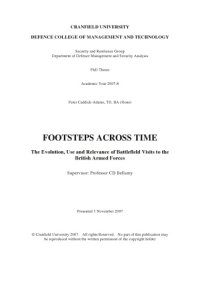This study examines the educational use made by military forces around theworld, but primarily those of the United Kingdom, of visits to past battlefields. Investigation suggests this practice commenced formally in Prussia and may be nearingits 200th anniversary; certainly the British Army?s Staff College at Camberley has beenvisiting battlefields for educational purposes since at least 1885. To date, no extendedacademic study of this practice has been undertaken, and no specific use of the StaffCollege Battlefield Tour Archive has been made in this context. An examination ismade of educational theory, by which the effectiveness and value of battlefield visitingcan be measured. This study creates a typology of battlefield visiting, and thusacknowledges a much older civilian tradition of making pilgrimages to past scenes ofconflict (initially to pray for the souls of the dead), which later evolved into civilianbattlefield tourism to destinations such as Waterloo and Gettysburg. The work examines the nature of British battlefield visiting, using the StaffCollege Battlefield Tour Archive, in four phases: before the First World War; during theinter-war period; during the post-Second World War and Cold War periods, and at thetime of writing. Throughout the study, parallels are drawn with military battlefield visitsundertaken by the American and German armed forces. The conclusion is made thatbattlefield visiting is a unique and valuable tool in military education that is not well managed, and that no recognition is given to its value in terms of classic educationtheory. Read more...
